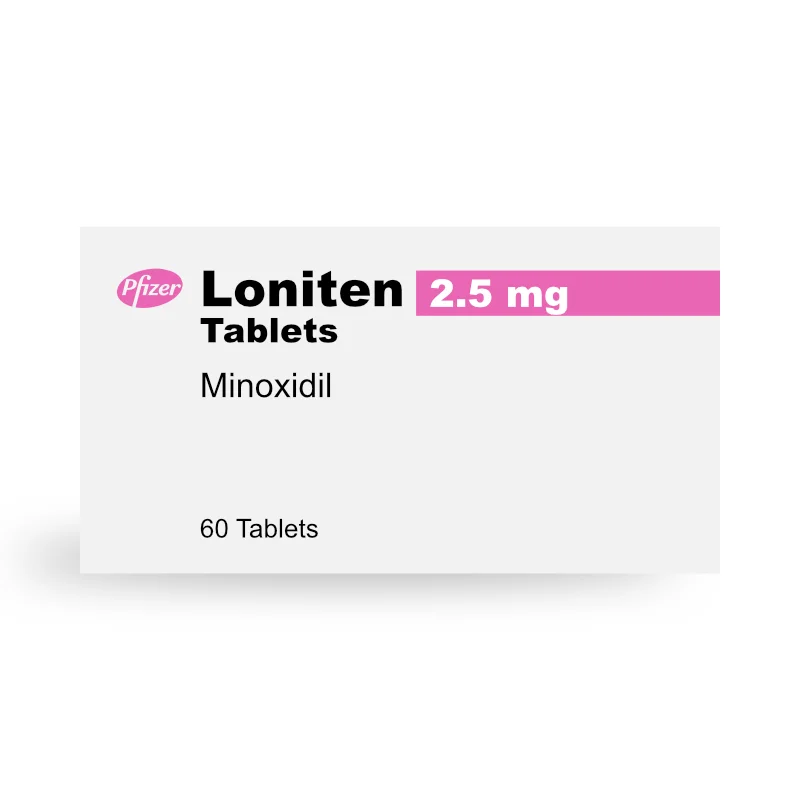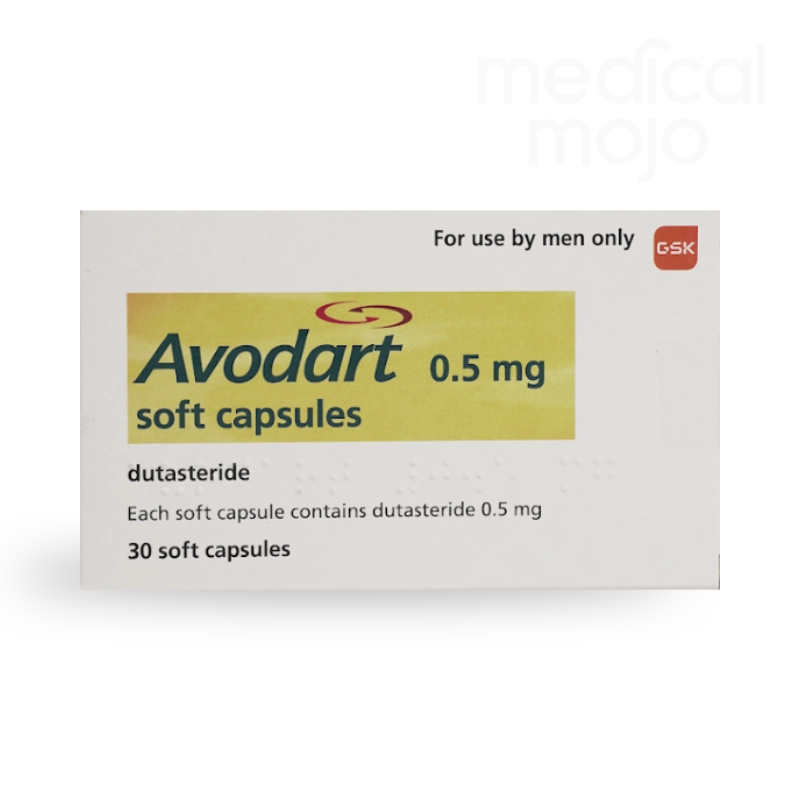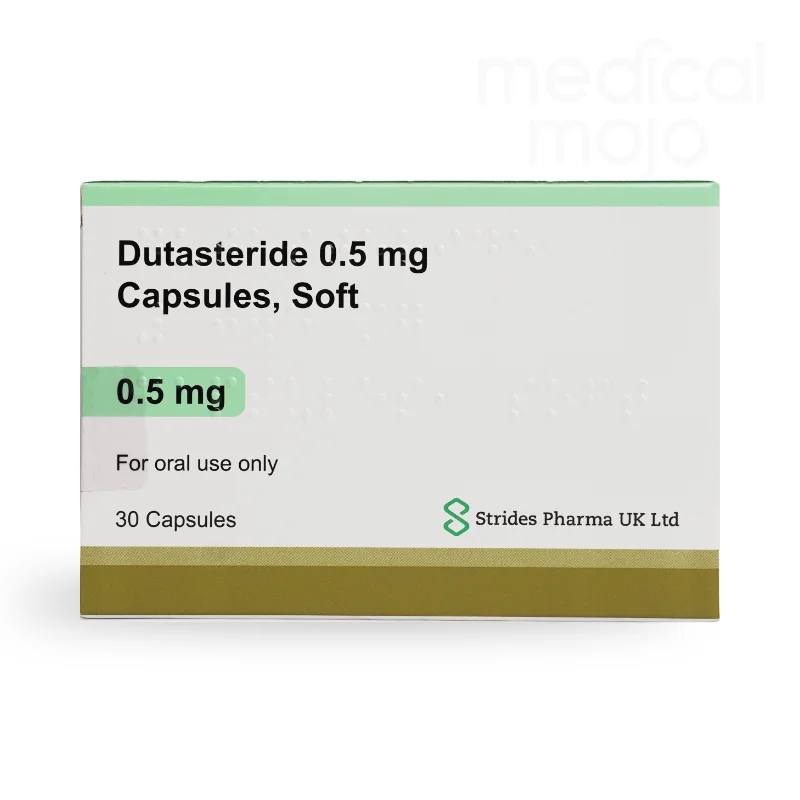Hair loss
Losing your hair? Try clinically proven hair loss treatments for men and women
Try the UK’s first compounded hair loss solution with 10% minoxidil.
Get the UK’s first compounded minoxdil oral capsule for hair loss.
Important
Compounded treatments, eg, LDN, ED patches, Melatonin, or for hair loss, are visible after completing a consultation. If you have previously purchased, you can reorder from your account.
Concerned about side effects of Finasteride and Dutasteride? Get in touch; we can create bespoke treatments at lower strengths to reduce side effects.
View All ProductsWhat you should know about hair loss treatments
Hair loss can be caused by various factors, including genetics (androgenetic alopecia), hormonal changes (such as those involving DHT), medical conditions (like thyroid disorders or alopecia areata), medications, stress, and poor nutrition. Identifying the underlying cause is key to determining the most effective treatment.
DHT (dihydrotestosterone) is a hormone derived from testosterone. It binds to receptors in hair follicles, causing them to shrink and eventually stop producing hair. This process is a leading cause of male and female pattern baldness.
Common treatments include topical minoxidil, oral finasteride, and dutasteride, which help to slow down hair loss and promote regrowth. Additionally, compounded combination solutions containing finasteride 0.1% and minoxidil 10% are available for topical application, reducing the risk of systemic side effects. Oral minoxidil 3mg capsules are also an option.
Finasteride and dutasteride are generally prescribed for men due to the potential risk of side effects, particularly in women of childbearing age. However, some women may be prescribed these medications under strict medical supervision. Always consult a healthcare provider before starting treatment.
Yes, finasteride can cause side effects such as sexual dysfunction or decreased libido. Minoxidil is generally well-tolerated but may cause scalp irritation or unwanted facial hair growth. Topical application of finasteride reduces the risk of systemic side effects compared to oral use.
Results from hair loss treatments like minoxidil or finasteride typically take several months to become noticeable. Most people see improvements within 3 to 6 months, but it can take up to a year for full effects. Consistency is key.
Yes, stress can trigger hair loss conditions such as telogen effluvium, where stress pushes hair follicles into a resting phase, leading to shedding. Managing stress through lifestyle changes and relaxation techniques can help reduce stress-related hair loss.
Hair loss can be reversible, depending on the cause. Treatments like minoxidil, finasteride, and dutasteride can be effective in slowing hair loss and promoting regrowth, especially when started early. However, in cases of significant follicle damage or prolonged hair loss, complete regrowth may not be possible.
Additional information
What is hair loss?
Hair loss, also known as alopecia, is a common condition that affects both men and women. It can occur gradually over time or suddenly, depending on the underlying cause. Hair loss can manifest as thinning hair, receding hairlines, or bald patches, and it can impact not only your appearance but also your confidence and self-esteem. There are various types of hair loss, including androgenetic alopecia (male or female pattern baldness), alopecia areata (patchy hair loss), and telogen effluvium (temporary shedding due to stress or illness).
What causes hair loss?
Hair loss can be triggered by a variety of factors, which may include:
- Genetics: The most common cause of hair loss is genetic predisposition, leading to conditions like male or female pattern baldness.
- Hormonal changes: Hormonal imbalances, such as those experienced during pregnancy, menopause, or thyroid disorders, can contribute to hair loss.
- Medical conditions: Conditions like alopecia areata, autoimmune diseases, and scalp infections can lead to hair loss.
- Medications: Certain medications, including chemotherapy drugs, blood thinners, and birth control pills, may cause hair loss as a side effect.
- Stress: Physical or emotional stress can trigger a type of hair loss known as telogen effluvium, where hair follicles enter a resting phase prematurely.
- Nutritional deficiencies: Lack of essential nutrients like iron, biotin, and protein can weaken hair and lead to hair loss.
- Hairstyling practices: Excessive use of heat, chemicals, and tight hairstyles can damage hair and cause it to fall out.
The role of DHT in hair loss
Hair loss, also known as alopecia, can be influenced by a variety of factors, with hormonal imbalances being one of the most significant. One of the primary culprits in hair loss, particularly in men, is a hormone called dihydrotestosterone (DHT).
DHT and hair loss: DHT is a derivative of testosterone, and it plays a crucial role in the development of male characteristics. However, it also has a significant impact on hair follicles, particularly those on the scalp. DHT binds to receptors in hair follicles, causing them to shrink over time in a process known as miniaturization. This leads to shorter, finer hair, and eventually, the hair stops growing altogether. This process is most commonly associated with androgenetic alopecia or male and female pattern baldness.
What are the symptoms of hair loss?
The symptoms of hair loss can vary depending on the type and cause but generally include:
- Gradual thinning on top of the tead: This is the most common type of hair loss, affecting both men and women as they age.
- Circular or Patchy Bald Spots: Some people experience smooth, coin-sized bald spots, which can occur on the scalp, beard, or eyebrows.
- Sudden Loosening of Hair: A sudden shock or stress can cause hair to loosen and fall out in large amounts.
- Full-Body Hair Loss: Certain medical treatments, like chemotherapy, can result in hair loss all over the body.
- Scaling Patches on the Scalp: This could be a sign of a fungal infection, such as ringworm, which needs medical treatment.
How to treat hair loss
Treatment for hair loss depends on the underlying cause. Options may include:
- Topical Treatments: Over-the-counter or prescription medications like minoxidil (Rogaine) are applied directly to the scalp to stimulate hair growth and slow hair loss.
- Oral Medications: Finasteride (Propecia) is a prescription medication for men that helps slow hair loss and promote regrowth by reducing the hormone levels that contribute to hair thinning. Additionally, Minoxidil is now available from MedicalMojo.co.uk as a 3mg oral capsule, offering an alternative approach to treating hair loss.
- Compounded Combination Hair Loss Solutions: MedicalMojo.co.uk also offers a compounded solution containing finasteride 0.1% and minoxidil 10%, which is applied topically as six sprays daily. The topical application of finasteride leads to fewer systemic side effects compared to oral administration, making it a preferred choice for some patients.
- Hair Transplants: Surgical procedures like hair transplants involve moving hair follicles from one part of the scalp to thinning or bald areas.
- Laser Therapy: Low-level laser therapy can stimulate hair follicles and promote hair growth in some individuals.
- Nutritional Supplements: Supplements containing biotin, iron, and other essential nutrients may support hair health and reduce hair loss.
- Lifestyle Changes: Reducing stress, avoiding harsh hair treatments, and maintaining a balanced diet can help manage and prevent further hair loss.
How Finasteride and Dutasteride work:
Both finasteride and dutasteride are medications that target DHT to combat hair loss.
- Finasteride: Finasteride works by inhibiting the enzyme 5-alpha-reductase, which is responsible for converting testosterone into DHT. By reducing the production of DHT, finasteride helps to decrease its levels in the scalp, which can slow down or even reverse hair follicle miniaturization. This results in a reduction of hair loss and, in some cases, regrowth of hair. Finasteride is typically taken as an oral tablet and is often prescribed for men with male pattern baldness.
- Dutasteride: Like finasteride, dutasteride also inhibits the 5-alpha-reductase enzyme but does so more effectively. Dutasteride blocks both types of the enzyme (Type I and Type II), leading to a more significant reduction in DHT levels. This makes dutasteride potentially more effective for some men in treating hair loss. However, it is important to note that dutasteride is typically used off-label for hair loss, as it is primarily approved for treating an enlarged prostate (benign prostatic hyperplasia).
Both medications can be effective in reducing hair loss and promoting hair regrowth, but they may also have side effects, including sexual dysfunction or a decrease in libido. It’s essential to consult with a healthcare provider to determine the most appropriate treatment option for your specific situation.
How to prevent hair loss
While not all hair loss can be prevented, certain steps can be taken to reduce the risk:
- Maintain a Healthy Diet: Ensure your diet includes essential vitamins and minerals that promote hair health.
- Handle Hair Gently: Avoid excessive brushing, tight hairstyles, and the use of heat-styling tools.
- Manage Stress: Practice stress-relief techniques like meditation, exercise, and deep breathing to minimize stress-induced hair loss.
- Avoid Harsh Treatments: Limit the use of chemical treatments, such as colouring and perming, which can weaken hair.
When to seek medical attention
If you notice sudden or excessive hair loss, or if your hair loss is accompanied by other symptoms like itching, redness, or pain, it’s important to consult a healthcare provider. These could be signs of an underlying medical condition that requires treatment. Additionally, professional medical advice is recommended if you’re experiencing hair loss due to hormonal imbalances, autoimmune diseases, or scalp infections.
Buy online from Medical Mojo
At Medical Mojo, we offer a range of effective hair loss treatments approved by UK-registered prescribers. Whether you’re looking for topical treatments like minoxidil, oral medications like finasteride, or compounded combination solutions, our online pharmacy provides a convenient and discreet way to access the treatments you need. We also offer Minoxidil as a 3mg oral capsule for those who prefer this form of treatment. Shop with confidence, knowing that our products are safe, effective, and delivered directly to your door. Regain your confidence and take control of your hair health today with Medical Mojo.
BSc Pharmacy, Independent Prescriber, PgDip Endocrinology, MSc Endocrinology, PgDip Infectious Diseases
Superintendant Pharmacist, Independent Prescriber
MbChB, Coaching Academy diploma with distinction
GP, Medical coach



